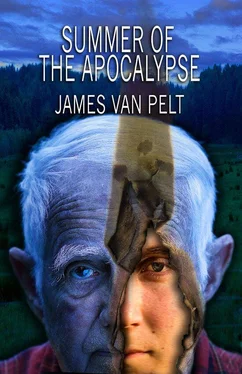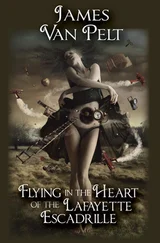“It’s nothing,” she said, but she stopped and faced him. Suddenly, he felt awkward. The only way to check the bruise would be to move the blouse off her shoulder, and he wasn’t sure how to do it. Taking a deep breath he pinched the lapel of her blouse and pulled the cloth aside. She pressed her hand against her chest so her bra wouldn’t be uncovered, and turned her head away from him. She was shaking. She said, “Don’t touch it.”
“Oh, god.” Beginning at her collar bone, a deep purple mark ran to the top of her shoulder, part way down her back and all the way to where her hand rested on her chest. “Are you sure nothing’s broken?”
“Just stiff,” she said, rearranging her blouse.
“Was it Jared?”
“Yeah.”
“It looks awful.”
She smiled. “You say the sweetest things, but you shouldn’t be talking.”
“What do you mean?”
“If you could see your neck, you’d think I was fine.”
Eric touched where the rope had dug in. Pain flared and he snatched his hand away. “Pretty ugly?”
“The worst.”
They’d reached the end of the destroyed houses and walked through another undisturbed neighborhood. Most of the homes now were old, brick duplexes with twin sidewalks leading to twin doors.
“My father died last year,” she said. “Liver cancer. I didn’t know him too well. He and Mom separated when I was little and I mostly got to see him in the summers. He lived in St. Louis.” They crossed a street. On this block, three or four yellowed, folded and rubber-banded newspapers were piled before the doors. Eric shivered at the thought of the dedication of some newspaper boy delivering papers to homes where the subscribers had died. Leda followed his gaze.
“They kept the paper going until ten days ago or so. Guess they thought a newspaper would keep people believing things would get better.”
Eric asked, “Did you love your dad?”
“I didn’t know him, I said.”
“That isn’t what I asked. Did you love him?” “Well, sure. I had to.” He thought that over. A new area of destroyed houses began, much the same as the last one. “This is weird. What do you make of it?” He stood beside a telephone pole. The cross arms at the top were snapped off and the wires were wrapped tightly around the shaft, like giant children had used it as a maypole,
“Don’t know. Maybe there is a god. While the people are away. the gods will play.”
“Sounds good to me.”
Dad might have come down just this street, he thought, and glanced at the lawn, thinking he might see a mark, a sign that had passed this way. How would Dad have seen this?
“When my father died,” she said, “I didn’t accept it at first. I told my best friend that he was sick, but not that he died. It took me a while to believe it myself.”
Eric thought, why does she keep talking about this? “My dad’s not dead.”
“Of course not,” she said quickly.
“He didn’t come back to the cave, so he must have gone home. He wouldn’t have just left me there.” Eric clenched his hands into stone. We could be standing in his footsteps! “ He would write a message and tell me where he went.” His face screwed up. He could feel the muscles by his eyes pulling in, his jaw tightening. He breathed in hitches.
“Of course. That’s what happened.”
“That’s why I’m going home. I’ve got to find Dad. We’ve got to go together and bury Mom.”
“Yes, that’s what we’ll do.”
Eric sat on the ground in the midst of the flattened houses, in the middle of God’s footstep, or King Kong’s. “My dad…” He gasped. “My dad is a survivor. He’s too strong.” Everything was letting go inside of him. He could feel the unraveling, and inside he tried to stop it, to hold back the wind. He put his face in his hands and he could feel his skin on his skin. Why do I feel this way?
Why am I acting this way? She’ll think I’m a fool. Dad’s fine. I’ll find Dad and everything will be like it was. We’ll live in the house. We’ll play catch. He’ll teach me new bird calls. Dad’s okay.
“No, it’s all right,” she said. “I believe you.” Her arms were around him and they were both sitting on the ground. She rocked him quietly while he shook in her arms.
After a long while, after he had quit sobbing and the muscles in his back relaxed, she still held him. He felt her chin resting on the top of his head.
“Look at that,” she said.
He lifted his head and blinked away tears. “What?”
They were sitting near another broken tree trunk. The trunk itself leaned and roots hung in the air on one side, clods of dirt still clinging to them.
“Sticking in the wood.”
He followed her finger. Protruding from the tree trunk, four inches or so of silver glittered in the sun. He pushed himself off the ground, then pulled on the metal.
“Jammed in there pretty tight.” He worked it back and forth several times before it pulled out. He held it to her. “A spoon. What would do that to a spoon? You couldn’t do that without bending it.” Taking it from him, Leda turned it over in her hand. “A tornado,” she said. “That’s what it was.” He gazed at the scene of destruction, and it seemed familiar, like news footage he’d seen before. “You’re right. Only thing it could be.”
“They skip,” she said. “They touch down, destroy everything, lift, then touch down again.”
“Darned regular. I’ve never heard of one leaving a trail.” “Strange storms. Leave some stuff, ruin others. If anything’s unusual, it’s how much it destroyed. Colorado tornadoes are generally narrower than this.” She gestured to the block-wide path.
“A year ago,” Eric said, “this would be the top story. Denver would be cleaning itself up. It’d be in mourning.”
She dropped the spoon. “Small potatoes, now, a tornado.” He smiled. It was incredibly hard to make that movement with his face. The muscles felt weighed down from frowning. “Does a house falling in a city make a noise if there is no one to hear it?”
“Come on,” she said, “let’s find some food. I’m starving.”
“I’m sure we’ll catch up with Dad soon,” said Eric. “He’ll be glad to meet you.” She didn’t say anything, and Eric glanced at her. “Sure,” she said, “I’ll bet he will be.”
Chapter Thirteen
GONE BUT NOT FORGOTTEN
Teach said, “Keep your hands underneath you. Don’t look up. Don’t separate your feet. Be a rock, and that’s what they’ll see.”
Eric scrunched his face into the gravel on the hillside above the road. The rest of Teach’s boys had scattered, and when he’d last looked, he could only pick out a couple of them in the same posture he was taking now, folded on themselves, faces down, practically invisible. Their leather skirts and wool shirts blended perfectly into the background.
“Where’s Rabbit and Dodge?” Eric whispered.
“They’re okay. Don’t move and you’ll be fine. Unless they’re expecting to see something, they won’t.” Teach broke a branch off a nearby juniper and jammed it into the ground by Eric’s head. He braced the bottom with a couple of rocks. “There, that’ll give them something to focus on if they do look this way.” Teach climbed a few feet up the slope and lay down, hands underneath him, feet drawn up, the back of his gray-haired head to Eric.
Eric pulled his limbs in even tighter; his back crawled under the heat of the sun. A bit of sand he’d sucked up when he put his face in the dirt gritted uncomfortably between his teeth, and chunks of gravel dug into his cheek, but he didn’t move. They’ll be able to see me, he thought. I might as well stand and shout. Before the point-man had whistled the warning that sent them scrambling for cover above the road, they had been walking up-canyon, crossing a slide that hid the asphalt for hundreds of yards, Eric was hiking gamely, trying not to slow the pace. Teach said, “You’ve got two problems.” Eric panted, put a foot on a stone, placed his hand on his knee and pressed to help himself up. One of Teach’s boys carried Eric’s pack, but even without the extra weight, the soreness in his legs and the incessant buzz of pain in his hips reminded him of his age. “What’s that?” he said. The mountain air smelled of pine and creek water, of sun on hot rocks, but it didn’t fill the lungs.
Читать дальше












